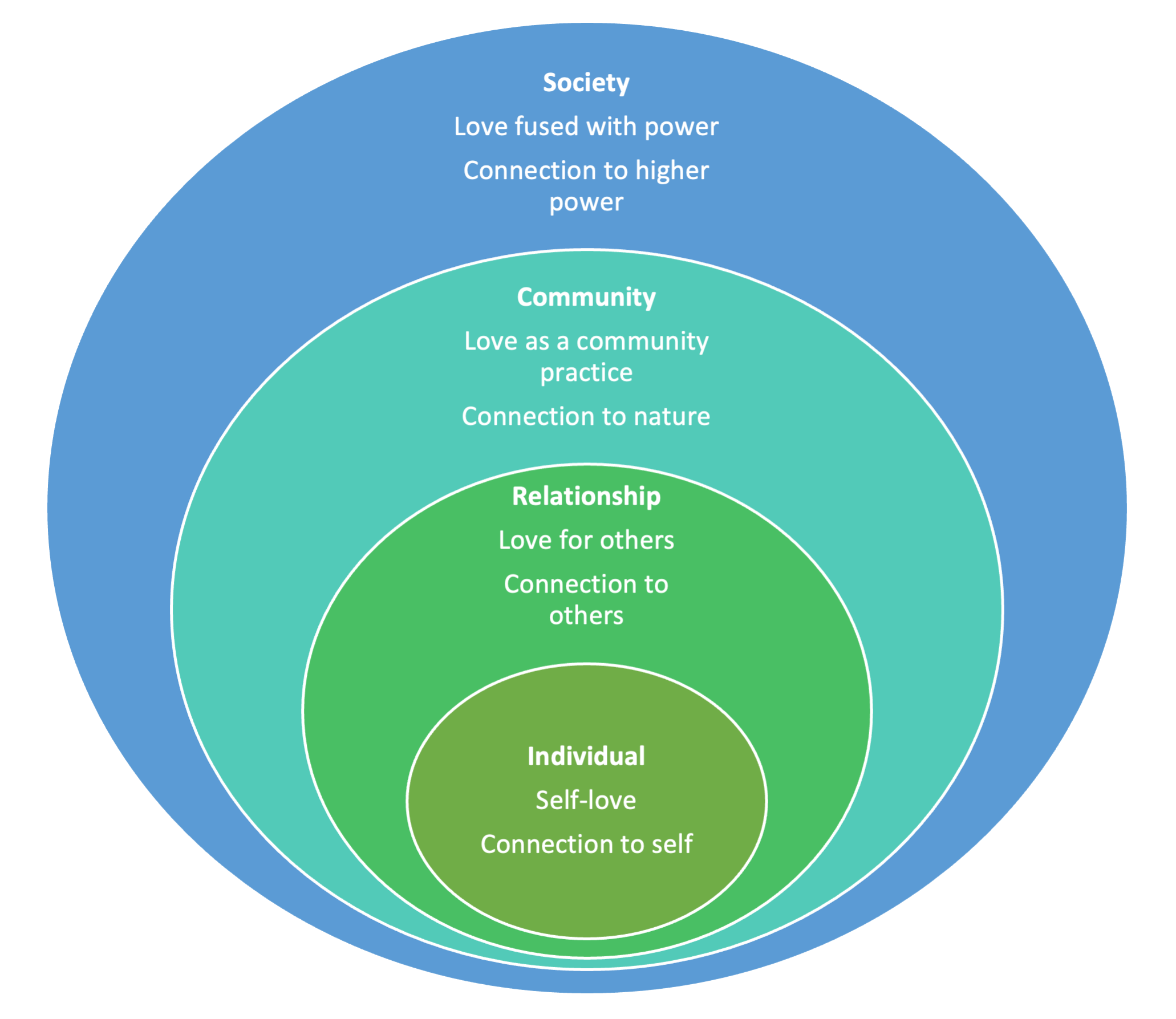by Casey Keene, Director of Prevention for the National Resource Center on Domestic Violence
“Spirituality is one of the ways that we connect with and strengthen the deepest part of who we are.” – Dr. Ghia Kelly
When Dr. Kelly described spirituality in this way during her recent webinar with NRCDV, I reflected on the importance of acknowledging and nurturing each of our spirituality, as survivors and advocates, in our work to prevent gender-based violence. Spirituality is about understanding our purpose and finding meaning in both who we are and what we do. It’s about leaning into our beliefs. Among these is the core belief that change is possible. For many of us, this hope is our why.
I also recalled the impactful webinar hosted by the Idaho Coalition Against Sexual & Domestic Violence back in June of 2020, White People: Reconnect to Our Spirit and Our Humanity to Interrupt White Supremacy, which described reconnection to spirit as a “reconnection to wholeness in ourselves, in others, and in the interconnectedness of all living things” (ICASDV, 2020). Both spaces – this and Dr. Kelly’s webinar – emphasized spirituality as a core component of our humanity. We have long known that centering humanity dismantles oppression. This connection to ourselves and each other, through spirituality, is a tool for collective liberation.
How spiritual health is connected to preventing gender-based violence
On its most basic level, well-being is our work. Among all of us working to end gender-based violence, our shared goal is healthy families and communities.
Our prevention strategies are often focused on improving the social determinants of health for communities most impacted. This approach is rooted in the core belief that everyone deserves wellness and safety where they live, learn, work, play, worship, and age. These determinants include access to quality education, health care, clean and safe environments, supportive communities, and economic stability.
Spiritual health cuts across many of these determinants, and can be found at all levels of the social-ecological model, the framework that drives our understanding of public health. More than simply an individual’s relationship with a “higher power,” the 4 dimensions of spiritual health, as Dr. Kelly describes in her paper, Spiritual Health Matters (November 2023), also include a person’s connection to themselves (personal), to others (social), and to nature (environment).
Holistic approaches to promoting well-being must include spiritual health, as described in the 8 dimensions of wellness by Tulsa Community College. Spiritual health is an often overlooked and under nurtured protective factor that promotes individual, family, and community healing and resilience, especially for those most marginalized. As Dr. Ghia Kelly lifts up in her paper, “The Black Church has been at the center of Black communities as the greatest source of religious enrichment and secular development and a leading voice in the fight against injustice and oppression” (NRCDV, 2023). In fact, existential support is often overlooked as one of the three key factors promoting human resilience, the others being internal and external support. Existential support includes the sources from which we draw meaning, values, faith, and culture. We cannot ignore the ways in which faith and culture are intertwined, both sources of strength and assets that can nurture and sustain us both individually and collectively.
Faith-based leadership for social change through love
Social justice movements in US history have been led by faith leaders and secular activists alike, working together towards common goals, driven by shared moral imperatives. Some faith traditions, such as Unitarian Universalism, explicitly define their commitment to social justice as a tenet of their faith. There are a multitude of examples of transformational social change work led by faith-based organizations and leaders throughout history:
- The Poor People’s Campaign builds on the work of Rev. Dr. Martin Luther King Jr. and others who called for a “revolution of values” in America.
- The Moral Movement led by Rev. D. William J. Barber, driven by the nonprofit Repairers of the Breach, strives for equal protection under the law, peace within and among nations, the dignity of all people, and shared responsibility to care for our homes.
- Side With Love is a public advocacy campaign of the Unitarian Universalist Association that seeks to harness love’s power to stop oppression.
- Love Resists is a Unitarian Universalist campaign to resist the harm inflicted by criminalization to create safer, more just, welcoming and sustainable communities.
Love is a core value and call to action in many faiths. In their Brown Paper, Measuring Love in the Journey for Justice, Shiree Teng and Sammy Nuñez call upon love – a verb, not a noun – as an antidote to injustice. They write, “It is love actively practiced in community, starting with ourselves, for positive material change, justice, and liberation” that has the power for transformation” (July 2019). Just like the 4 dimensions of spiritual health described above, and its parallel levels of the social ecology, the authors offer similar dimensions for emergent, transformative, catalytic love: self-love, love for others, love as a community practice, and love fused with power. Each dimension has measurable indicators we can harness in actualizing this work. Faith traditions have historically centered love as the pathway to peace.
The chart below shows how the dimensions of spiritual health and love align within the social-ecological model.

Spiritual activism: Connecting spiritual health with action for social change
“Spiritual activism is spirituality for social change, spirituality that recognizes the many differences among us yet insists on our commonalities and uses these commonalities as catalysts for transformation” (Keating, 2005).
For many, social change work (read: prevention) happens at the intersection of inner purpose and outward commitment to others. This is known as “spiritual activism,” which plays an important role in movement building and social change. In the video Spiritual Activism, Reverend Dereca Blackmon breaks down how our spirituality connects with the inner activist in all of us.
The importance of interconnectedness
"Thinking about ‘community’ has helped me understand the relationship between religion and social justice.” – Shilpa Rao in Community, Faith, and Social Justice (2018)
Spirituality is about our connection to ourselves and to others. Spirituality emboldens us to get in touch with our core beliefs and live into our values. As described above, love, among these, is a “radical and conscious act of resistance” (July 2019). In PreventConnect’s 3-part webinar series, Measuring Love in the Journey to End Sexual and Intimate Partner Violence, Shiree Teng and Audrey Jordan explore the practice of radical love in our work to prevent gender-based violence. They invite advocates to be more conscious, explicit, and heart-centered in ways that build love + power for self, teams, and communities.
When we center our humanity, the nature of our interconnectedness is undeniable. From that we can draw hope that change, indeed, is possible.
How can you bring spirituality into your work to prevent gender-based violence?
Learn more about the connections between faith, spirituality, and preventing gender-based violence:
- Special Collection: Faith, Spirituality, Religion & Domestic Violence (June 2023)
This collection embraces the understanding that religion is a layer of one’s cultural identity. Culturally affirming victim-defined advocacy must center spirituality for survivors. Acknowledging, respecting, and understanding religion is critical to creating a holistic response. Advocates and faith leaders can embrace this unique resource for survival, healing, and resilience. - TA Guidance Package: Spiritual Health Matters (November 2023)
Spirituality is important to the holistic health of survivors and can be a critical component of a survivor’s healing journey. This TA Guidance package features two new publications that offer guidance to advocates and faith leaders working to promote spiritual health and allyship. - TA Question: As an advocate at a secular program, how can I support and validate the religious beliefs and spiritual needs of survivors? (July 2013)
This TA Question offers guidance to advocates on supporting and responding to survivors who utilize their faith as a healing strategy.














